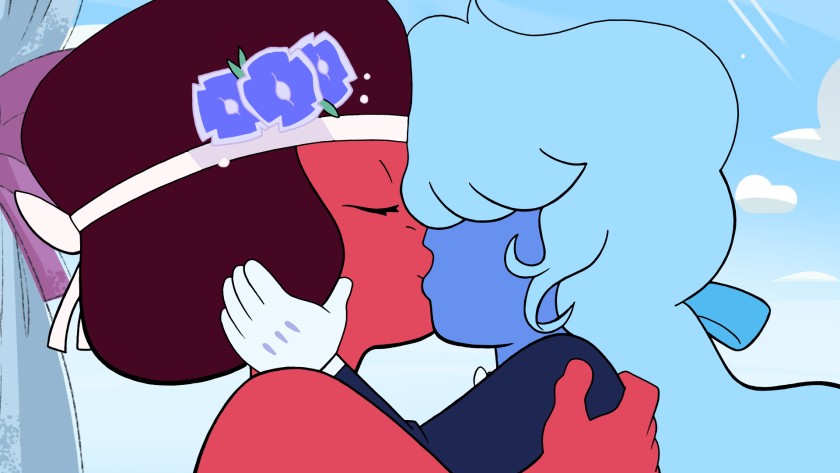One of the most important things about Steven Universe – both on a broader cultural level and a deep personal level for many – is what it means to people in the LGBTQIA+ communities, as well as other communities underrepresented in the myopic mainstream cultural lens.
SU was created and run by a nonbinary, bisexual genius; it tells stories (including the overarching narrative) written from queer perspectives; it normalizes queer characters while also making them visible to kids; and it depicts queer joy when all too often queer characters are written as exclusively tragic, suffering figures.
As a cisgender, heterosexual man, that’s not my story to tell, but I believe it would be unforgivable to leave the beautiful queerness of Steven Universe unsung. So, I’m linking to essays/articles/posts by people with a personal connection to this aspect of the show. Every single one of these links is well worth your time, and if you want to find more, they don’t even represent the tip of the content iceberg.
—————
“Steven Universe” Is the Queerest Cartoon on Television – “The show is also boundary-breaking for the way it portrays queerness; in fact, it may stand as the most progressive cartoon on TV in terms of queer representation.”
—————
Steven Universe is the glaad-award winning kids show i wish i had growing up – “I love the normalcy Steven Universe applies to LGBTQ+ topics. The show treats queerness and gender fluidity as completely normal and okay—because they are! And children need to know that.”
—————
Steven Universe creator has done more for LGBTQ visibility than you might know – “We need to let children know that they belong in this world,” [Sugar] says. “You can’t wait to tell them that until after they grow up or the damage will be done. You have to tell them while they’re still children that they deserve love and that they deserve support and that people will be excited to hear their story. When you don’t show any children stories about LGBTQIA characters and then they grow up, they’re not going to tell their own stories because they’re gonna think that they’re inappropriate and they’re going to have a very good reason to think that because they’ve been told that through their entire childhood.”
—————

—————
Steven Universe Is the Queerest Animated Show on TV – “What’s radical about Steven Universe, the brainchild of Adventure Time alum Rebecca Sugar, is not that it shatters gender boundaries. It glides over them as if they didn’t exist in the first place.”
—————
Steven Universe: 5 Ways This Kids Show Was Queer Before Its Lesbian Kiss – “Since its premiere in 2013 on Cartoon Network, the show has wielded zany comedy, drama, and visual metaphors to teach its children—and adult—viewers that identity isn’t chained to heteronormativity.”
—————
Steven Universe: The Movie Prepares The Queer Community For A Fight – “At the heart of Steven Universe is a theory of social change that values empathy and emotional intelligence over violent, direct action. It’s not that the show abhors violence. The characters match fist-for-fist, whip-for-whip, and sword-for-sword with their enemies all the time, and at one point organized militarily to protect the Earth. It’s that violence is rarely deemed a final answer for solving systemic problems, and only used when nonviolent approaches fail. We truly win, the show argues, when we emotionally connect with our enemies and convince them to abandon their endeavors.”
—————
Steven Universe creator says farewell, knowing her show made young LGBTQ viewers feel seen – “Sugar dealt with what were perceived to be ‘very difficult themes around youth television: mental health, issues of gender orientation, sexual orientation, trauma,’ Sorcher says. ‘And I think that she handled all of those issues with a grace and an elegance that made all the difference.”
—————
The Queer Ecology of Steven Universe – “Steven Universe offers a narrative of living with without resignation: living with failure, living with damage, and living with hope. Its queer ecological ethic demands action and imagines efforts that aren’t perfect and are still better than what we had before.”
—————
This one isn’t from a queer perspective, but I included it anyway:
How Steven Universe Taught Me to Embrace My Neurodivergent Identity – “This repeated theme of learning to accept our differences in how we look, think, and love as a strength, not a weakness, is why Steven Universe has become so popular, especially with members of the LGBTQ and neurodivergent communities. For kids, teens and adults who felt their identities to be a source of shame, Steven Universe provided not only a safe, colorful world which showed characters struggling with those same issues and growing from them, but also a thriving, passionate community of like-minded fans.
—————

